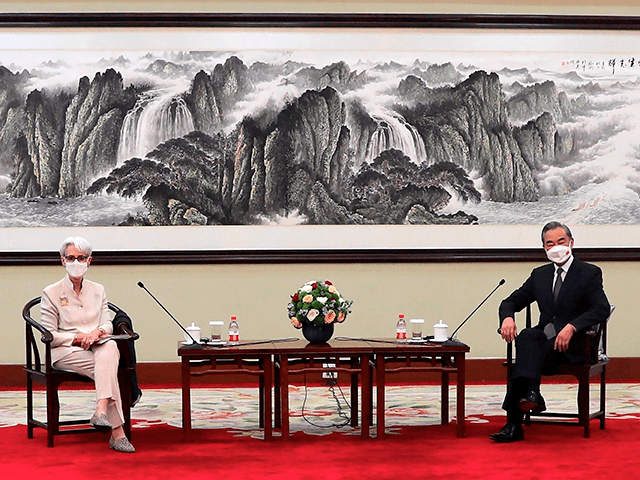The Chinese government’s perspective on this week’s diplomatic visit by Deputy U.S. Secretary of State Wendy Sherman was very different than the upbeat assessment of the State Department.
Even as the Biden administration claimed Sherman had “frank and open” talks with her opposite number, Foreign Minister Wang Yi, Chinese media and officials derided her visit as pointless and futile.
“The Deputy Secretary raised concerns in private – as we have in public – about a range of PRC [People’s Republic of China] actions that run counter to our values and interests and those of our allies and partners, and that undermine the international rules-based order,” the State Department said on Monday.
One of these concerns was supposedly China’s reluctance to fully cooperate with investigations into the origins of Chinese coronavirus, including China’s recent refusal to permit a second visit by World Health Organization (W.H.O.) researchers.
Reuters on Monday noted that China “seized the narrative” for Sherman’s trip to the city of Tianjin by effectively replaying the surprise attack that left Secretary of State Antony Blinken speechless at the Biden administration’s first summit with China in March.
Vice Foreign Minister Xie Feng handled ambush duties with Sherman, ridiculing her mission to reporters while she was speaking behind closed doors with other Chinese diplomats:
“The United States wants to reignite the sense of national purpose by establishing China as an ‘imaginary enemy’,” Xie was quoted as saying while the talks were underway.
The United States had mobilized its government and society to suppress China, he added.
“As if once China’s development is suppressed, U.S. domestic and external problems will be resolved, and America will be great again, and America’s hegemony can be continued.”
Biden administration officials scrambled to downplay the importance of Sherman’s visit, even as the White House claimed she was setting the Chinese straight on such crucial issues as human rights in Xinjiang province, the oppression of Hong Kong, and China’s relentless cyber-espionage:
“It is important for the United States and China to discuss areas where we disagree so that we understand one another’s position, and so that we are clear about where each side is coming from,” a senior administration official said.
“Reaching agreement or specific outcomes was not the purpose of today’s conversations,” a senior U.S. official said.
Chinese Foreign Ministry spokesman Zhao Lijian gave a press conference on Monday in which he made it sound like Sherman did more listening than talking as her Chinese hosts presented her with a list of “wrongdoings” the Biden administration must correct without delay, including the revocation of visas to Chinese Communist Party (CCP) members, “suppressing Chinese companies,” “harassing Chinese students overseas,” attacking communist propaganda operations like the Confucius Institute, and attempting to procedure Huawei executive and Communist Party royalty Meng Wanzhou for sanctions violations.
Zhao said Sherman was further instructed to correct the “growing anti-Asia, anti-China sentiment in the U.S.”
“The U.S. side sought China’s cooperation and support on climate change, the Iranian nuclear issue and the DPRK [North Korean] nuclear issue among others. In fact, China has been playing a responsible and constructive role on all these issues,” Zhao said.
“It needs to be emphasized that cooperation should be based on mutual trust, mutual benefit and a sound atmosphere for bilateral relations. The U.S. should adopt a correct view of cooperation. It simply won’t work when the US seeks cooperation with China while harming China’s interests,” he asserted.
“Well, the Sherman visit to China is shaping up to be a disaster. Who is asking for these meetings?” Heritage Foundation Director of Asian Studies Walter Lohman sighed on Monday as he surveyed the diplomatic carnage.

COMMENTS
Please let us know if you're having issues with commenting.